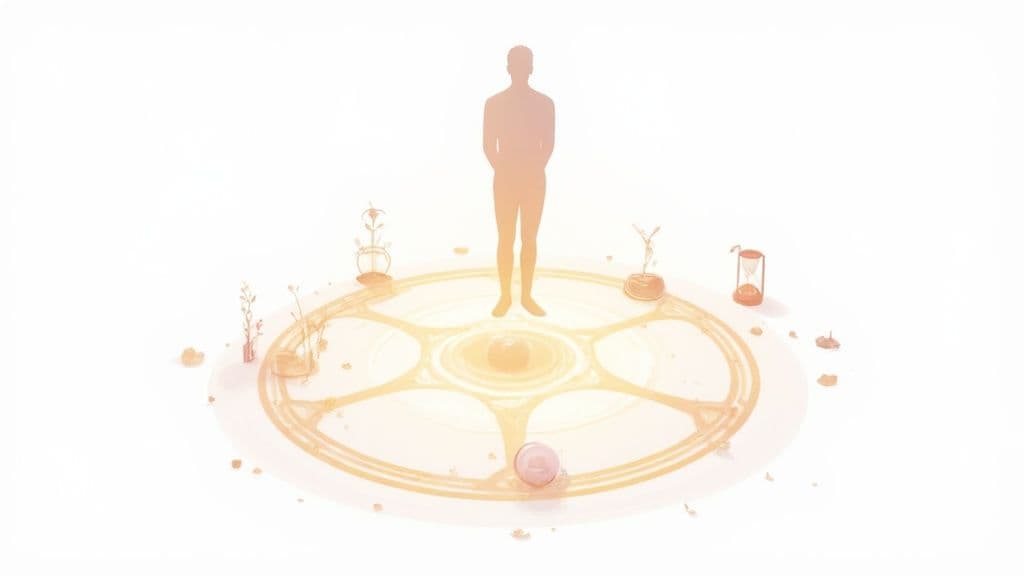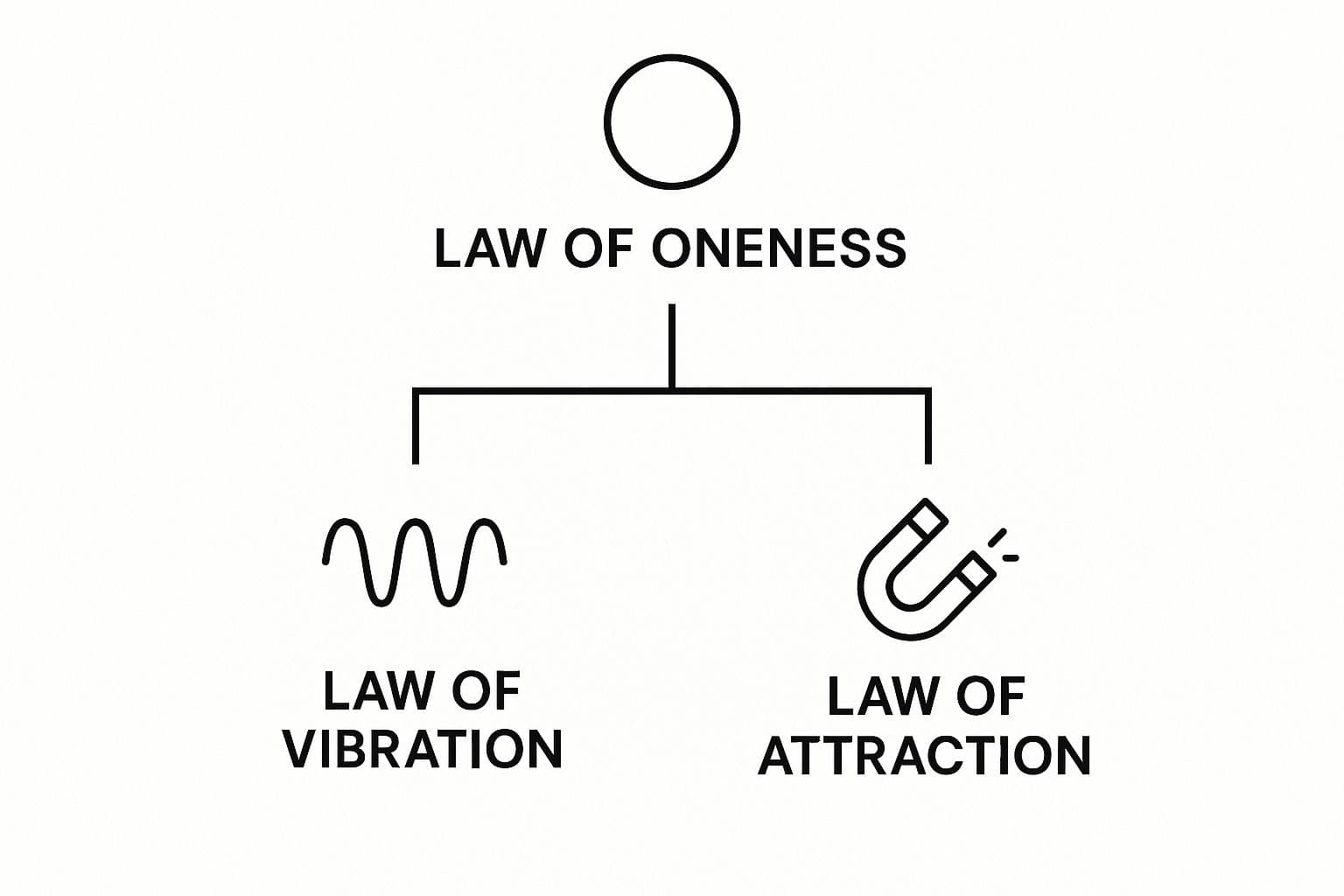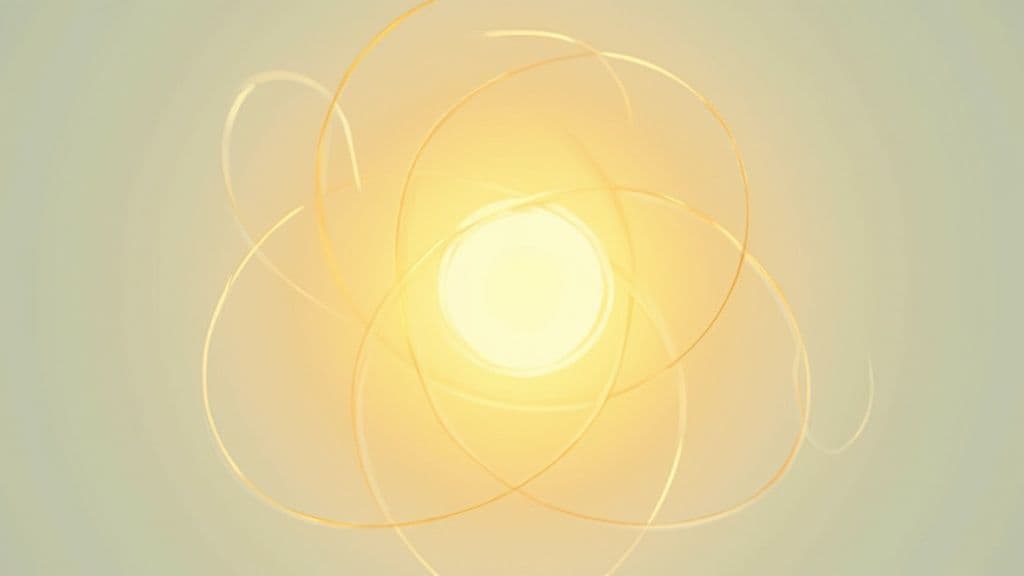Discover three simple, practical spiritual laws that help you make clearer choices, trust the timing of growth, and live with more presence. These principles aren’t dogma; they’re everyday tools you can use to move from reacting to consciously creating your life.
July 27, 2025 (5mo ago) — last updated November 13, 2025 (2mo ago)
3 Spiritual Laws for Personal Growth
Learn three practical spiritual laws—Choice, Process, Presence—and step-by-step practices to build clarity, purpose, and steady personal growth.
← Back to blog
3 Spiritual Laws for Personal Growth
Learn three practical spiritual laws—Choice, Process, Presence—and step-by-step practices to build clarity, purpose, and steady personal growth.
Introduction
Discover three simple, practical spiritual laws that help you make clearer choices, trust the timing of growth, and live with more presence. These principles aren’t dogma; they’re everyday tools you can use to move from reacting to consciously creating your life.
Core idea: Invisible principles shape your inner life
Like gravity shapes the physical world, underlying principles shape our inner life. These aren’t rigid rules or religious commands. Think of them as invisible currents that influence your growth, relationships, and sense of purpose.
Your life has an operating system
Imagine spiritual laws as the operating system running quietly in the background of your life. You don’t need to read every line of code to know that saving your work protects it. Likewise, these principles shape your experience whether you notice them or not.
Learning how they work shifts you from being a passenger to being the driver. Instead of feeling tossed by circumstances, you can cooperate with these forces and learn to read the currents so you can move with them.
What are these laws?
These laws act as a practical roadmap for self-discovery. They reveal subtle cause-and-effect links between your inner state and outer reality. Three core ideas stand out:
- Choice: Recognize the power you have to steer your life through daily decisions.
- Process: Growth unfolds in stages; honor natural timing, like a seed becoming a tree.
- Presence: True clarity and power are found in the present moment.
Foundational concepts such as oneness often serve as umbrellas for principles like vibration and attraction.

Why this matters now
Interest in spiritual and personal development continues to grow, as millions seek practical tools for a more conscious life. The spiritual and wellness market has been projected to reach substantial value in the coming years1.
Core spiritual laws at a glance
| Spiritual Law | Core Principle | Area of Impact |
|---|---|---|
| Balance | Find moderation in all things | Emotional stability and health |
| Choices | You are the sum of your decisions | Personal responsibility and empowerment |
| Process | Every journey has necessary steps | Patience and long-term goals |
| Presence | Power is found in the present moment | Mindfulness and stress reduction |
| Compassion | Treat others with kindness | Relationships and community |
| Faith | Trust in a larger order | Overcoming uncertainty and fear |
| Expectation | What you expect, you often receive | Mindset and manifestation |
| Integrity | Align actions with values | Authenticity and self-respect |
| Action | Intentions must be followed by deeds | Achieving goals and purpose |
This table is a starting point; each law has layers worth exploring.
Ultimately, working with these timeless principles isn’t about controlling life. It’s about harmonizing with it. When you do, your path feels less like a struggle and more like a meaningful journey.
How the Law of Choice shapes your reality

The Law of Choice is one of the most powerful tools you have. Daily decisions, large and small, are the building blocks of your life. The intention behind each choice matters: decisions rooted in fear create different results than those made from love.
When you make conscious choices aligned with your values, you create momentum toward your true path. Choices driven by habit, social pressure, or fear keep you stuck.
The energy behind decisions
Picture your life as a story you write one sentence at a time. Each choice is a sentence. Are you writing courage and authenticity, or conformity and reaction? This idea appears across spiritual traditions. Buddhism, for example, emphasizes mindful intention as fundamental to the path2.
“Choice is the act of creation. Before you act, you have a choice. After you act, you have a consequence.”
Quick practice for aligned choices
A brief internal check helps you choose with clarity:
- Identify the motivation: Is this choice coming from fear or love?
- Notice the energy: How does the thought of this choice feel in your body?
- Align with values: Does this reflect the person you want to be?
Practicing this check moves you from unconscious reacting to conscious creating. For related guidance on life purpose and intention, see The Four Purposes of Life.
Embracing the Law of Process

We live in a world that expects instant results. The Law of Process reminds us that real growth takes time. Like a garden, you create conditions and then trust the natural rhythm of growth.
Much powerful work happens beneath the surface, so don’t measure progress only by visible milestones.
Finding value in the in-between
Waiting, learning, and struggling are where your spiritual muscles strengthen. If you rush the foundation, the structure will be unstable. Character, wisdom, and resilience form through quiet persistence.
The journey itself is where your spirit is tempered and your resilience is built.
How to cultivate patience and trust
Practical ways to align with the Law of Process:
- Acknowledge small wins.
- Practice mindful observation to notice slow shifts.
- Set process-based goals, like “meditate five minutes each morning.”
These actions help you work with time instead of against it. For more perspective on spiritual growth, see this reflection on the journey of spiritual growth4.
Finding power in the Law of Presence

Your real power isn’t in replaying yesterday or worrying about tomorrow. It’s here, now. The Law of Presence brings attention back to the only place where life actually happens.
Living in the past holds you in regret. Living in the future invites anxiety. Both drain energy and blind you to opportunities in the present.
Anchoring yourself in the now
Presence is a skill you can build with small, concrete practices. Mindfulness practice shows measurable benefits for reducing stress and anxiety, and consistent practice improves attention and emotional regulation5.
These grounding practices are the foundation of many spiritual traditions. For global context on how people practice presence, see regional religion data3.
The point of power is always in the present moment. This is where you plant seeds for a different future.
Practical steps for cultivating presence
- The Three-Breath Reset: Take three deep, intentional breaths to return to the body.
- Engage your senses: Name five things you see, four you feel, three you hear, two you smell, one you taste.
- Single-task: Give full attention to one activity at a time.
Consistent practice rewires attention. Decisions grow clearer, relationships deepen, and your spirit becomes more attuned to present wisdom. For guided practices, explore resources on practicing presence in daily life.
Weaving spiritual laws into everyday life
Knowing these laws is one thing; living them is another. The point isn’t adding more tasks. It’s shifting perspective—seeing everyday moments as opportunities for practice.
A simple daily framework
- Morning Intention (Choice): Before you get out of bed, choose an energy to embody: patience, gratitude, or calm.
- Commute (Presence): Use travel time as a mindful pause—notice your breath and the rhythm beneath you.
- Tough Conversation (Choice and Compassion): When tension rises, pause and ask, “What would be the most compassionate response?”
If you want a guided path, explore Dan Millman’s practical teachings on purpose and practice at the Life Purpose App.
When impatience shows up
Impatience is normal. When frustration appears, lean on the Law of Process.
A quick checklist:
- Acknowledge the feeling.
- Pinpoint what you’re trying to rush.
- Reframe with the Law of Process: What is this phase teaching you?
- Take one tiny action that moves you forward.
These techniques help you turn knowledge into lived wisdom.
Busting myths about spiritual laws
These laws are not a cosmic vending machine. They don’t guarantee instant results just by thinking positive. They’re a practical compass for aligning who you are with how the world works.
They also don’t promise a life without problems. Instead, they equip you to meet challenges with perspective and strength.
Not dogma or easy answers
Spiritual laws aren’t the same as religious rules tied to a single tradition. They’re universal principles that operate whether you notice them or not. This work is about personal responsibility and self-awareness, not obedience to an external authority.
The point isn’t to escape the messiness of being human, but to enter it with eyes wide open.
Real spirituality asks you to apply inner work in daily life. That’s where integrity and action matter most.
Frequently Asked Questions
Q: How are these "laws" different from religious rules?
A: Religious rules come from specific texts and institutions. Spiritual laws are universal principles—like gravity—that reveal how thoughts, choices, and actions create results.
Q: Do I have to be religious to work with these laws?
A: No. These principles are non-denominational. Anyone can use them, regardless of belief system.
Q: What’s the best first step?
A: Start by observing. Notice your choices and how often your mind leaves the present. Gentle awareness is the foundation of change.
Quick Q&A: Three practical questions and answers
Q: What is the easiest practice to start today?
A: Pick one small habit, like three intentional breaths on waking, and do it daily. Small, consistent practices compound.
Q: How will I know if this is helping?
A: Watch for subtle shifts: clearer decisions, less reactivity, and steadier progress. Celebrate small wins.
Q: What if I get discouraged?
A: Use the Law of Process. Reframe setbacks as learning phases, acknowledge one small step forward, and keep your practice simple.
Ready to discover your unique life path and how these spiritual laws apply directly to you? The Life Purpose App offers access to Dan Millman’s system to uncover your core gifts and challenges.
Discover Your Life Purpose Today!
Unlock your true potential and find your life’s purpose.
